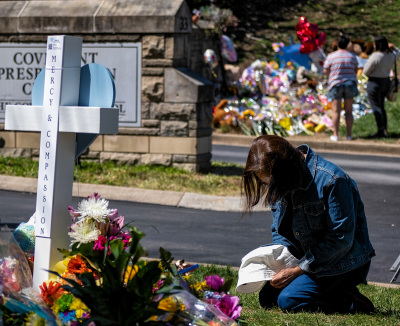Surprisingly little coverage of Covenant School's mercy to shooter

It gives me no pleasure that two of my most-read pieces on Substack were reactions to mass shootings. In April, I wrote about the Covenant School shooting, where former student Audrey Hale took multiple innocent lives before the police stopped her.
There’s been surprisingly little ongoing media coverage in the wake of the crime — or, perhaps, not so surprising, given that the identities of both killer and victims sat disturbingly with popular media narratives. It was morbidly interesting to watch writers wavering in real time over whether to refer to Hale as “she/her” or “he/him.” Clearly, there has been an incentive to move on from this particular mass shooting as quickly as possible.
But in some circles where I run, the school has come into renewed focus recently, for something that isn’t actually new news (it’s the essence of social media that some things only become “news” after enough people notice them). That new-old news is the fact that the victims’ families pooled their resources to pay for the funeral of their killer. Audrey Hale’s parents didn’t have to spend a dime to give her a proper burial.
In context, it’s helpful to note that Hale’s parents are in fact Christians themselves. This exposed them to some of the ugliest hot takes in the wake of the shooting, as leftist press implied they were hateful for not “accepting” Audrey’s trans experiments (while allowing her to live in their home, as an adult woman). Given that they’re active in their Christian community and that Hale used to attend the school, it’s likely that some Covenant people know them well. So this was, among other things, a kindness extended by Christians to fellow Christians who are just as shattered by that day of horrors, if not even more so.
Still, I think one could legitimately describe the act as supererogatory: virtuous beyond the basic demands of virtue. Is it praiseworthy and merciful for Covenant to pay for the funeral of their children’s murderer? Yes. Did they have to do it? No. That’s what made it merciful. In a similar way, we award medals for extreme valor “above and beyond the call of duty.”
People seem to be having difficulty threading this needle in their reactions to this news. There is an especially vocal niche of the reactionary right where the school’s choice is being framed as weak, pathetic, or excusing Hale in death. Some are going so far as to say it exemplifies a Christian heresy, arguing there’s no precedent in early church history for covering a violent enemy’s funeral expenses. Never mind that the church then and the church now are separated by a thousand differences in cultural context, including the obvious fact that there’s no early church analogy for a situation where a persecutor was raised by Christians. But even aside from this, the point of the kind gesture is not to excuse Hale’s crimes. Forgiveness, by definition, means there is something to forgive. Otherwise, it has no meaning or force. This is the difference between “It doesn’t matter” and “I forgive you.”
Granted, there could be rhetoric that is unnecessarily generous, not merely in the sense of extending mercy but in the sense of saying something that simply isn’t true. I tread with caution here, because at least one victim’s family member has used this rhetoric, but I think this applies to the choice to label Hale as a “victim” herself.
That is importantly false.
Perhaps, with enough recontextualization, one might say she fell victim to insidious propaganda about her identity. But, with humility and respect, I think it is legitimate to criticize rhetoric that would flatten the sharp asymmetry between Hale and her victims.
I also think that where anyone is pressing the claim that it would be a sin not to cover her funeral, this should also be criticized. The invention of new sins is a dangerous business. Jesus tells Christians to love their enemies. He does not provide detailed guidance for the form this must take in every time and circumstance. This is the form Covenant chose for it to take in this time and circumstance. Let us say that it is praiseworthy and excellent, and let that be enough.
Meanwhile, I find it equally regrettable that the left has weaponized words like “compassion” and “mercy” and that a bitter contingent of the right can’t recognize genuine compassion and mercy when they see it. They can’t recognize the sort of charity people spontaneously extend to each other, human to human, without trying to polish a halo or earn social credits. In their minds, there must always be a catch, a hidden angle. People must always be “looking left” for approval.
Is it possible that some individuals in the Covenant orbit are advancing ideas that would chime with leftist policy? Maybe. Some leaders like Brent Leatherwood may take the occasion to push for gun control. It’s fully legitimate to criticize this. But that doesn’t change the fact that in their human response to the most heinous of crimes, like other Christian victims of that crime before them, the parents of Audrey Hale’s victims have modeled the highest and most humbling form of Christian charity. We would do well to imitate it.
I’ll close this by quoting a bit from myself the last time we cycled through this discourse when a father forgave his son’s murderers. We’ve seen all these beats before, and we will see them all again. But as long as they keep coming up, I’m going to keep tapping the sign.
Any good man can forgive. But it is only the Christian who can explain why. And it is only the Christian who has a place to turn when he must cry out to someone, “I forgive, help my unforgiveness.” Like Corrie ten Boom, when she found she could not in her own power forgive the Nazi prison guard who had tormented her sister. It was then that she turned to a power not her own. She did not need to feel forgiveness, she realized. She needed only to choose it, and trust in God to do the rest.
May we never have to choose so terribly. May it never be asked of us to do what Corrie ten Boom did, what the Charleston church did, what Brandt Jean and Craig DeWitt have done. Still, may these examples be ours to consider, to marvel at, and in our own small way, to follow after.
Bethel McGrew is a prolific freelance writer, educator, and conservative communicator, with bylines in First Things, National Review, World Opinions, and more. Her Substack, Further Up, is one of the most popular newsletters offering cultural commentary in Christian perspective.



























